A play review of ``Hexarchy'', which can be played by 1 to 10 people and can be played by 1 to 10 people, which combines Civilization-like simulation with card deck construction and can be completed in about an hour.

Collect cards and build decks in
Steam: Hexarchy
https://store.steampowered.com/app/1356810/Hexarchy/
Start Hexarchy. In addition to ``Single Play'' where you can play alone, there is ``Online Play'' where you can play online with friends or strangers. This time, I chose 'Single Player' to play alone. Please note that Hexarchy has been translated into Japanese, so even people who are not good at English can play it without any problems.

Select 'Single Battle'. If you have never played a 4X game or a deck building game, we recommend playing the 'First Campaign' first, which explains not only the rules but also the system from scratch.

There are 10 types of civilizations in total, and at the start of the game you can choose from 6 civilizations: Greece, Egypt, Rome, England, Aztec, and Persia. As you play more, Russia, France, China, and Arabia will be released depending on your experience points. This time, I set the civilization to 'random'. After deciding the game settings, click 'Start'.

This time it was played in France. In 4X games like Civilization, you select your favorite action every turn and proceed, but in this Hexarchy, the key is to ``select an action from among the cards dealt as a hand.''

First, in order to build a capital that will be the starting point of civilization, click 'Create Capital' from the cards in your hand.

Select the square where you want to build your capital. You can get the resources produced every turn by making the 6 squares around the capital your own territory. A floating white arrow will appear at convenient points and the word 'recommended' will be displayed, so if you are not used to it, we recommend that you use this as a reference.

'Paris' was founded.
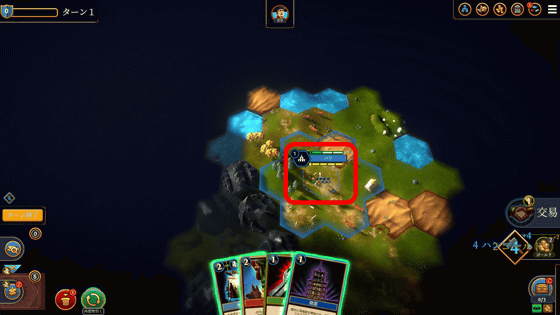
As mentioned earlier, you must select a card each time you take an action on your turn. However, a cost is set in the upper left of the card, and you cannot select an action unless you pay this cost. For example, in the upper left corner of 'Wood processing techniques' below. It has a hammer icon and the number '2' written on it. This is the basic cost for this hammer to act, and the hammer you have is displayed on the right side of the screen. This time I have 4 hammers, so I can use ``Wood Processing Technique'' by consuming 2 of them.
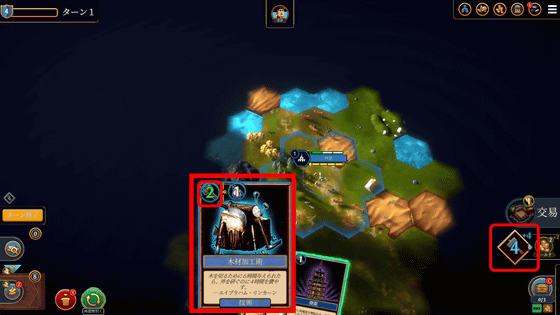
'Wood Processing Technique' is a research card, and by using it, a new card will be added to your deck. In other words, when you play a research card, you have more options for future actions.
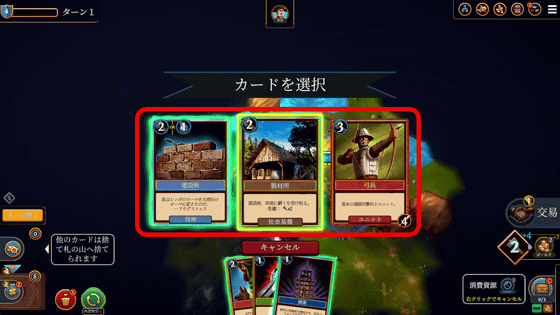
The number of cards in the deck is displayed on the left side of the screen. The top row is the number of discarded cards, and the bottom row is the number of cards in the deck. The core of the game system is the element of a deck building game: ``The more cards you have in your deck, the lower the probability that the card you're aiming for will appear.''
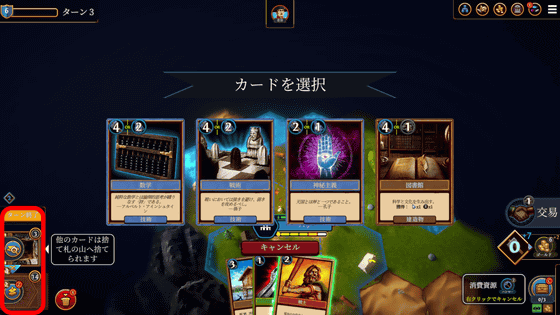
Therefore, as the game progresses and the number of cards in your deck increases, it is important to discard unnecessary cards. For example, as the game progresses, the initial military unit 'Warrior' becomes an unnecessary card. Now, drag the 'Warrior' card to the trash can icon on the left side of the screen.
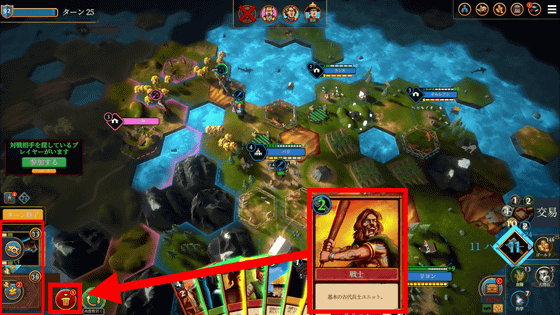
By discarding cards, you can not only reduce the number of cards in your deck, but also get a hammer, which is a great deal because you can get more hammers and 1 resource 'Science' only when you discard cards for the first time in each turn. Therefore, it is very important to 'compact' your deck by discarding cards that are no longer needed as soon as possible. If you keep increasing the number of cards without discarding them, you will receive a warning, but conversely, you can also easily aim for the 'tower' strategy, where you increase the number of cards you can draw in one turn without discarding any cards.
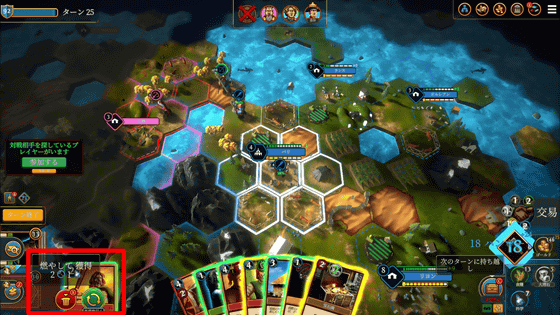
When a city is built, people live there, and as the number of people increases, they need food and luxury goods to support their happiness. In addition, resources such as stone and wood are required to construct buildings and research new technologies. To get resources every turn, you need to create facilities in your territory. Below is a selection of cards for the facility 'Ranch' where you can get food.
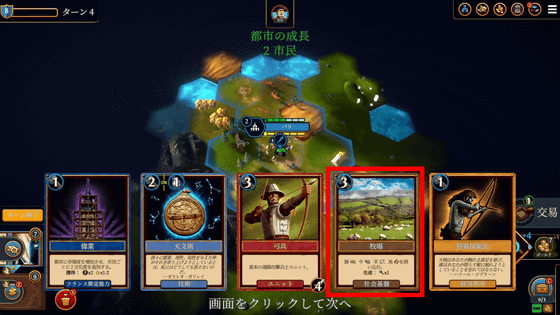
A ranch was created by clicking on a square with a herd of animals in the territory. This will allow you to get additional cows as food every turn. As the population increases, cities become larger and the amount of food needed increases accordingly, so food is absolutely necessary in order to strengthen and expand your country.
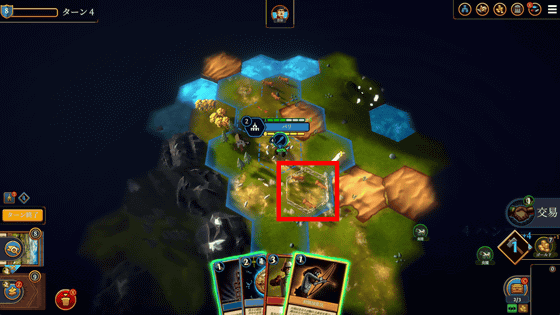
The collected resources are displayed at the bottom left of the screen. Unused resources will be carried over to the next turn, but there is an upper limit to the amount that can be carried over. In the case below, you have 11 food + 1 marble = 12 resources in total, but as you can see in the treasure chest icon, you can only carry over up to 7 resources. Therefore, the surplus must be sold through 'trade' and converted into gold, or distributed to each city.
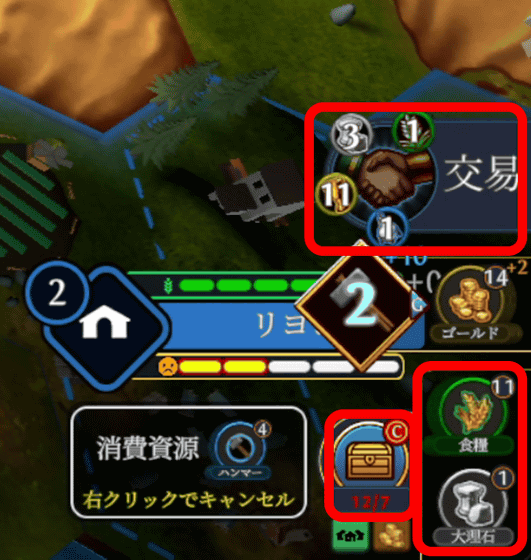
In addition, if you end the turn with resources remaining, the surplus will be automatically converted to gold or automatically distributed to each city according to the policy activated in advance using the icon at the bottom.
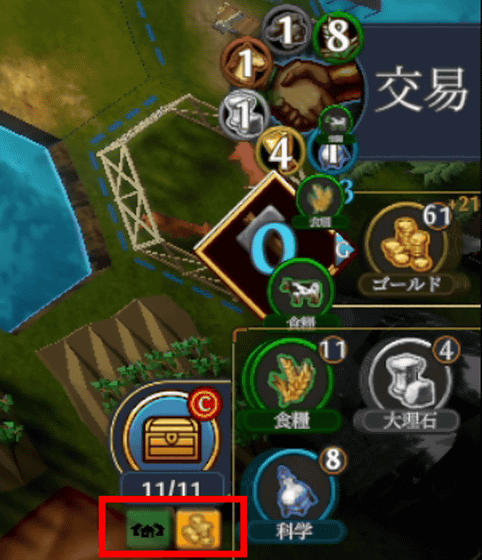
In order to expand a country's territory at once, it is necessary to create cities, and in order to increase new cities, 'settlers' are required. When you select the 'Settler' card and click on a city, a settler will be born in that city.
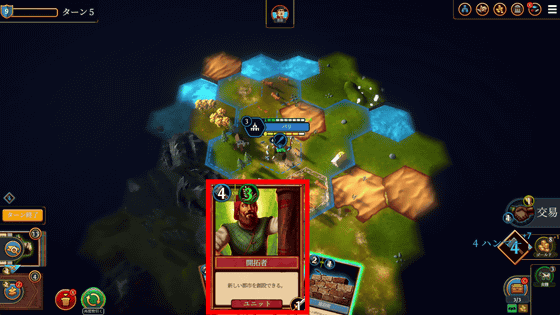
Build a new city by moving your settlers to the location where you want to build a new city.
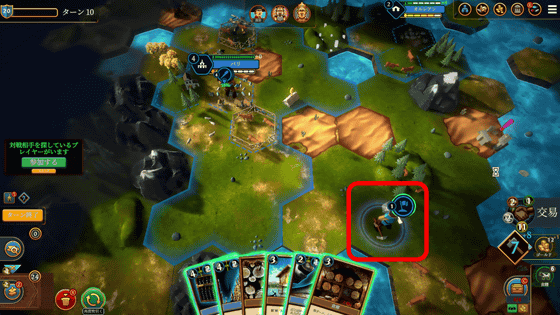
Lyon is completed southeast of the capital, Paris.
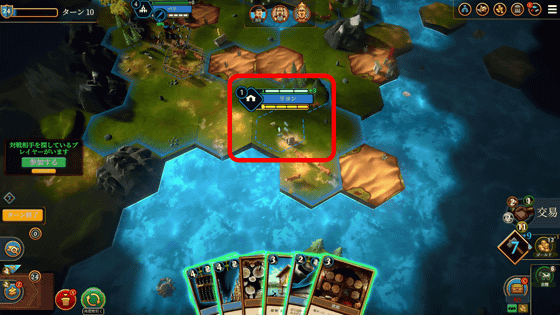
Then, looking northeast of Paris, enemy settlers had arrived in the unoccupied squares between Paris and Orléans.
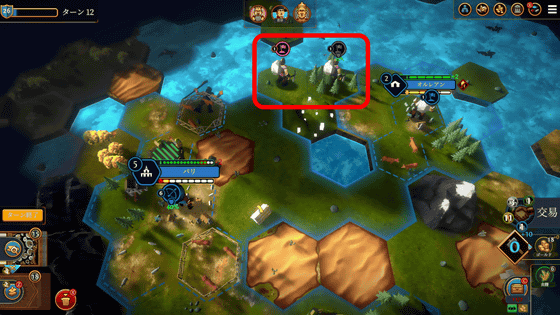
He had to swat away the flies that flew in front of him, so he dispatched 'warriors' from Paris. Defeat the enemy's settlers with this warrior. Units can move and take actions every turn without using cards.
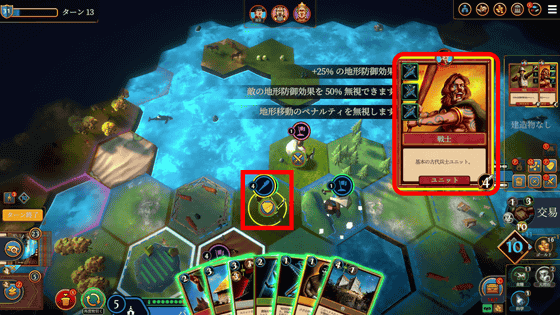
But why are there settlers from an enemy country in a place like this? When I looked at the map, I discovered that Rome (purple) and China (pink) were fighting each other right near Paris.
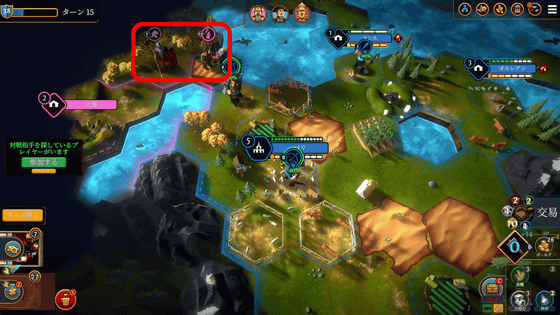
Apparently China was stronger, and Roman soldiers were being kicked around by Chinese soldiers. It would be very troublesome for us to be invaded and lose our capital.
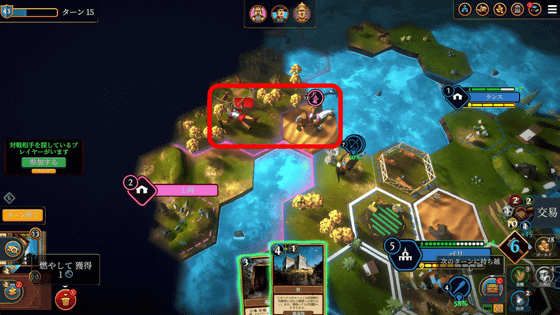
Paris and enemy territory are located across the ocean and connected by a 1 space wide road. Therefore, we will set up a ``fort'' on this 1 space wide road.
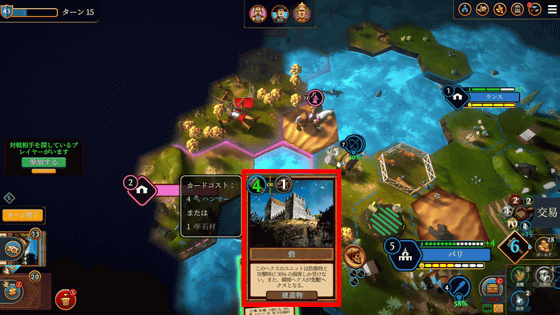
If you set up a fort, the defense power of military units will increase, so unless there is a significant difference in strength, it is unlikely that it will fall immediately. In the fort I created, I have an archer on standby who can attack from a distance.
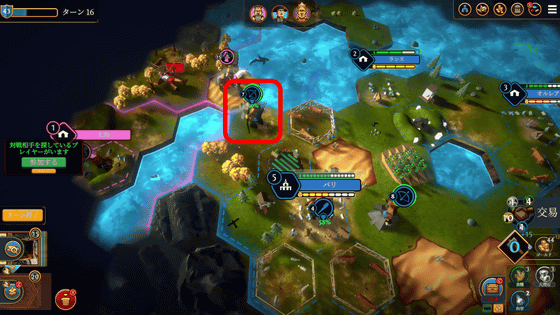
After solidifying their defense in the north, they will also build the Great Wall of China, the Wonder of the World, within their own territory. 'Wonders of the World' is a so-called world heritage site, and when you build it, you will receive bonuses such as resources and victory points, as well as special effects.
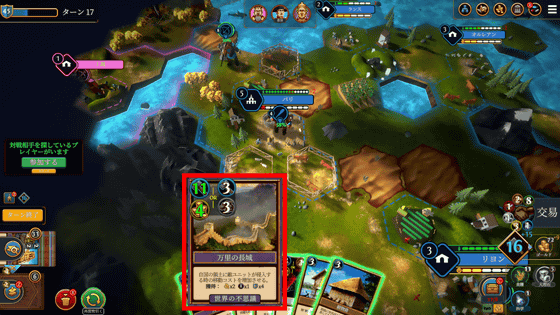
'Great Wall of China' has the effect of increasing the movement cost of enemy units within your own territory, so it is perfect for preparing for defense.
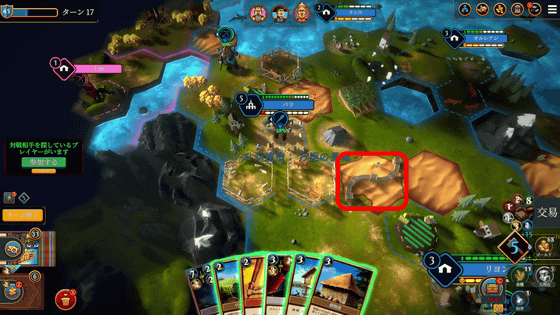
Immediately, Chinese 'warrior' units attacked the northern fort.
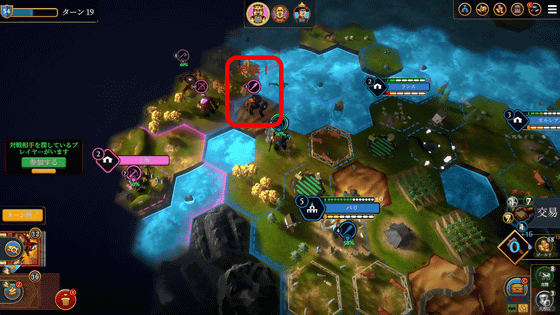
However, due to its increased defense power, the damage to archers is small, and the warrior units are wiped out by counterattacks.
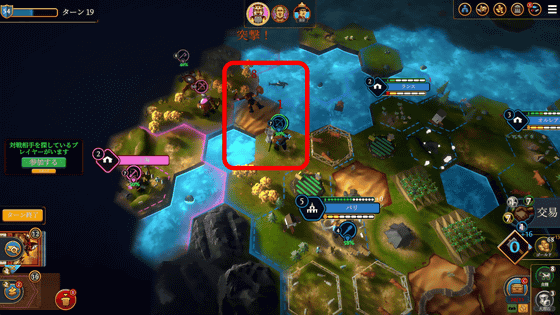
Since defending the north is no problem, we will expand our territory to the south. However, China's territory was still expanding there.
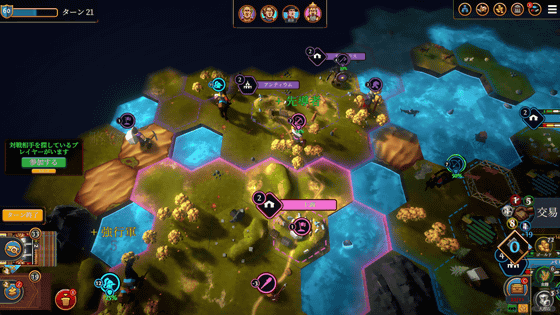
However, through repeated research, the level of military units that can be produced is gradually increasing.
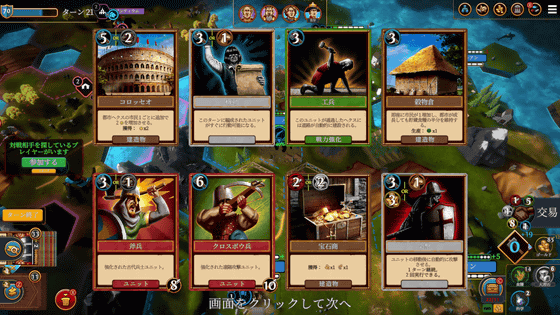
Taking this as an opportunity, he sent troops from Tours, a city south of Paris, to Xi'an, which was nearby. Furthermore, there appear to be no military units protecting Xi'an.
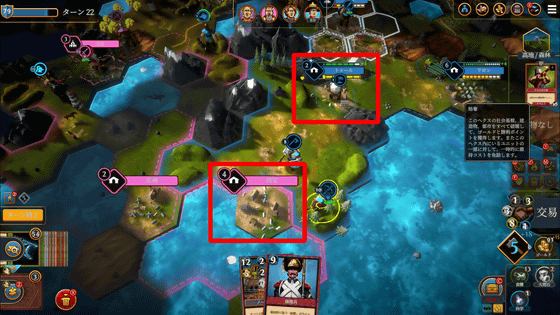
When axemen specializing in close combat were dispatched, they easily succeeded in occupying Xi'an.
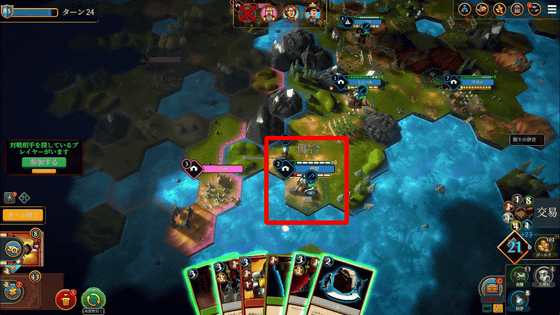
In Hexarchy, the number of turns in the game is fixed, so the game ends when there are no more turns, regardless of the progress of civilization. When the game is nearing its end, an announcement will appear on the screen that says 'The end of the game is near.'
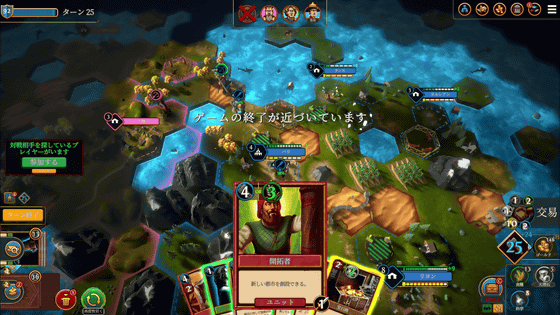
From the end of the game, you decide that it will be quite difficult to defeat China, so in order to increase your victory points as much as possible, you will build facilities and wonders of the world that will give you victory points.
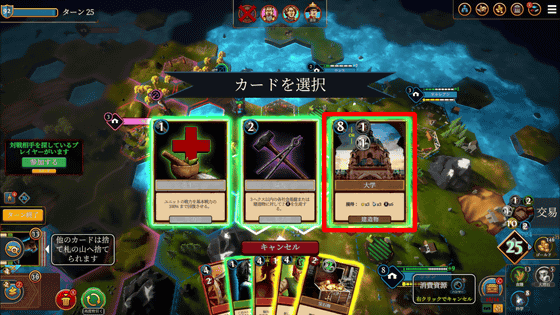
Then the turn comes and the game ends. As a result, they collected 103 points and took first place by an overwhelming margin. Play time was approximately 50 minutes.
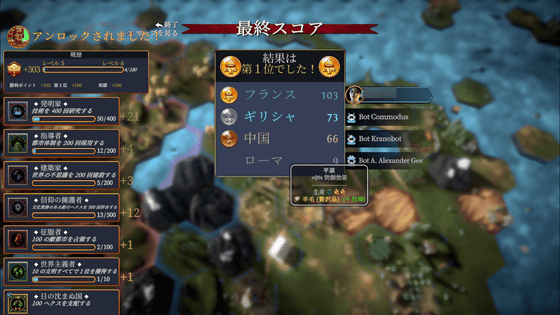
4X games like the Civilization series require you to choose various actions while looking at various parameters and situations. However, people who are not used to 4X games tend to get stuck in a state where there are so many things they can do that they don't know what to do. However, Hexarchy presents action options using cards, so even people who are not familiar with 4X games can easily understand what they can do now. Each civilization has its own characteristics depending on the composition of the card deck, so the point is that the play style changes for each civilization.
Another big feature is that the total number of turns is fixed, so you can play the game in about an hour. The ``Civilization'' series is so addictive that it is sometimes referred to as an ``electronic drug,'' but Hexarchy maintains the fun of 4X games, but has proper breaks in the game, so you can say, ``Before you know it, half the day is already over.'' 'I just kept playing' doesn't happen. Of course, you can adjust the length of the game when playing the game, so those who want to sit down and play more can play with confidence.
For beginner players who often have difficulty winning, the editor-in-chief, who plays for an hour every day, has arrived at the basics of winning strategies for each civilization. This should help you escape being a beginner!
Card carryover required
Any number of cards can be carried over to the next turn as long as there are spaces available. However, the number of new cards drawn decreases by the number of cards carried over, so the number of cards in your hand is always constant. The first turn is especially important, so if you have a clear goal like 'I want to build this next time,' you should discard other resources and carry over cards.
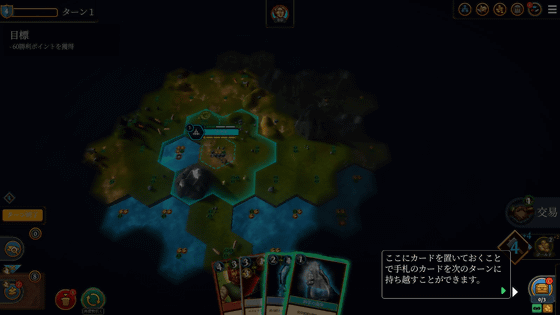
The 'warehouse' is essential in the early stages in order to increase the number of carryover items and keep as many resources on hand as possible. Build warehouses in every city and arrange them so that you can play cards in the order you want.
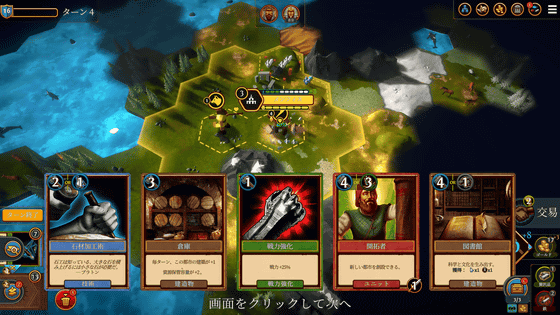
“This country is the best!” Strategy
If you drop more luxury goods into a city where happiness is at its maximum, you will be able to see what percentage of the time the 'This country is the best!' will be activated. You will receive 1 victory point each time 'This country is the best!' is activated, so if you have too many luxury goods or can buy a lot of luxury goods cheaply through trade, activate 'This country is the best!' You should let it happen. Especially if you have built a lot of cities, or if you have a lot of cities by attacking enemy countries, it is easy to earn victory points with the 'This country is the best!' strategy.
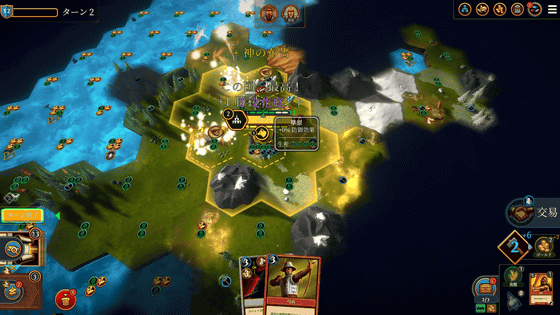
Secure resources cheaply through “trade”
It is best to always have the necessary resources on hand when you need them, and the same thing can be done with 'trade'. By building a 'port', you can ensure that you have some cheap resources available each turn through trade, making it easier to use the cards you have at hand, and also allowing your city to grow reliably. Highly recommended.
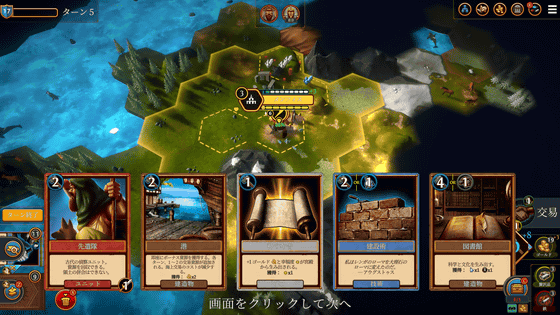
Prioritize the “wonders of the world”
Especially powerful is ``Look at the next 3 cards'' of ``Parthenon''.
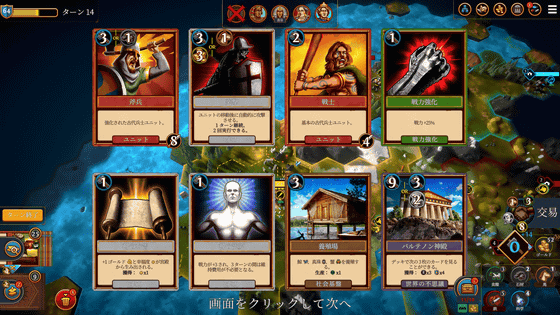
You will be able to see the deck as shown in the bottom left. In Hexarchy, you can draw a card by paying 2 gold, so if you tend to have too much gold and hammer, you will have to decide whether to buy resources through trade and grow a city, or draw a card and increase something. will occur, but knowing the next card will make it easier to plan your strategy.
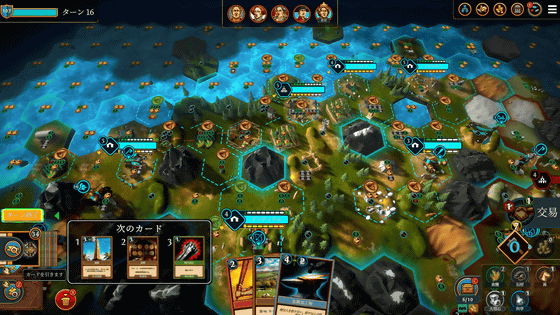
Construction of 'roads' on supply routes between cities
From the icon in the upper right corner, you can see how much maintenance costs are incurred between each city and each military unit. An easy way to reduce this maintenance cost is to build roads to connect cities. Depending on the civilization, there are some breakdowns such as ``building a road just by moving this unit'' or ``increasing production every time it moves on the road'', so it is good to create roads effectively according to the combination of your civilization. . No matter how many hammers you have, you'll never have enough, so it's nice to have stones. Therefore, it is extremely important to secure a mine that can produce stone.
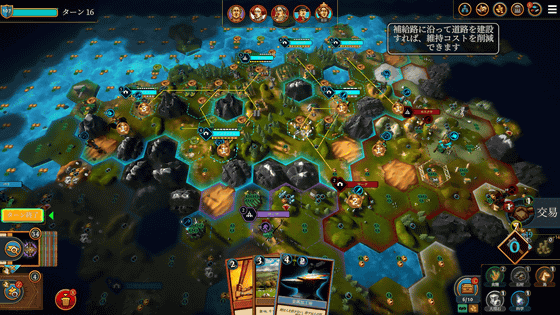
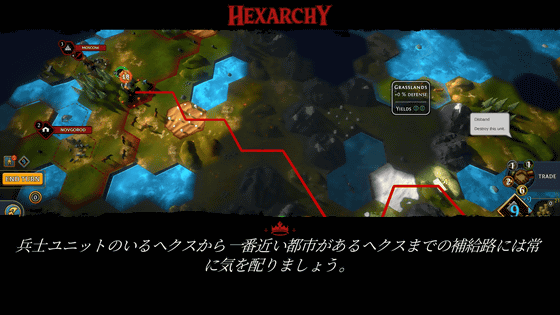
Cultural invasion should be done
If you look at the 'Culture status' from the icon in the upper right corner, you can see how much time it will take to expand your borders. As you raise the level of your country's culture, your territory will automatically expand each turn, and the number of hammers etc. will increase accordingly. ``What's the point if you can't move on the ocean or to a remote island?'' The reason is that it's advantageous to expand your territory based on your cultural level. In particular, some civilizations tend to expand their territory by the sea, and there are cases where building a city with the sea at your back can actually be advantageous in later turns. If your culture level is overwhelmingly higher than your opponent's, you can gradually weaken your opponent's territory by chipping away at it without occupying it, so it is extremely advantageous to have a culture advantage in the second half when your country becomes vast. .
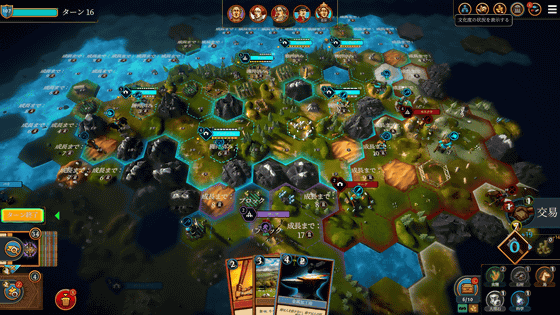
The first step in cultural invasion is the library. Building a library in every city is quite advantageous. Science creates things and increases the level of culture, which can be said to be the cornerstone of enriching the country and strengthening the military.
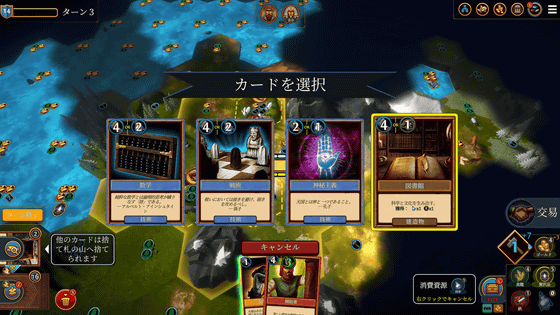
'Resources' can be displayed at all times
Information that is always needed when moving military units to occupy hexes or construct cities is 'What resources can I get from here?' If a card unique to your civilization requires a resource, you should give priority to securing that resource. For example, if you have a card that requires a 'horse', if you can produce it every turn in your own country instead of buying it through trade, you can instantly create an advantageous situation, and if you sell the surplus horses through trade, you can earn more money and increase the amount of money you have. It is possible to create a domino chain reaction by buying insufficient resources with money and allocating them to cities to accelerate growth and increase victory points.
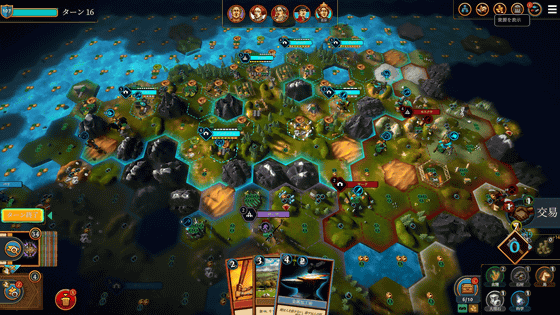
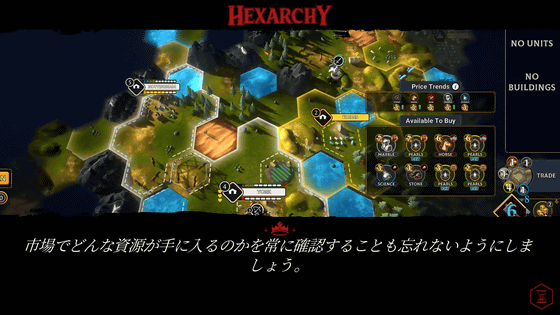
Interfering with city construction with the “Advance Corps”
Unless you have a clear murderous intent such as 'I'm going to destroy the enemy country!', your top priority in Hexarchy is to secure victory points. Conversely, it is important to not allow your opponent to take actions that will lead to victory points. An effective way to hinder the construction of a city is to use an 'Advance Corps.' If you send the enemy's settlers to a place where they are likely to build a city in advance and wander around, they will be unable to build a city, and you will be able to use your resources. You can replenish your supplies and waste your opponent's turn count = time. Once an enemy country's city is built, it will take a considerable number of turns to capture and occupy it, so don't hold back until you are ready.
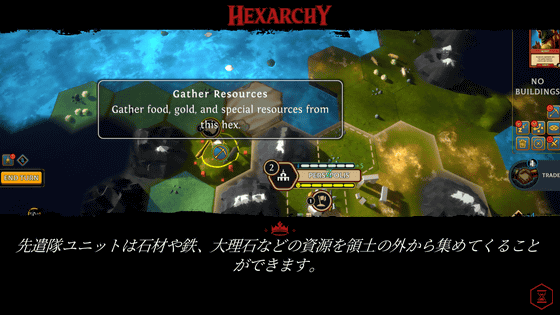
Secure a “hut” with priority
When looking at a map, you may find a place with a '?' icon. You can move any unit and get a lot of resources, so it is quite advantageous to secure units with extremely high movement power or advance troops. Especially if it is near your own territory at the beginning of the game, you can boost it considerably.
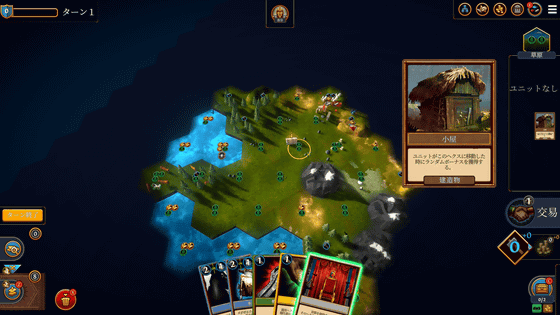
Definitely secure the “sacred place”
Not only does it give you victory points, but when you capture a sacred place, you can also capture surrounding hexes at once. Card effects also increase victory points if you have a sacred place, so there's no harm in having it, and in fact, you should definitely secure it. In particular, if you can involve holy places when constructing your first capital, you can start with an expanded territory. Having a lot of territory makes it easier to expand your territory through cultural invasions, and having a lot of territory makes it easier to reach hexes that produce resources, so it's super important.
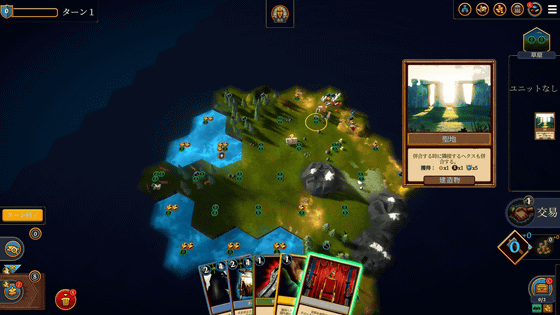
As shown below, you will have such a vast territory in the first turn.
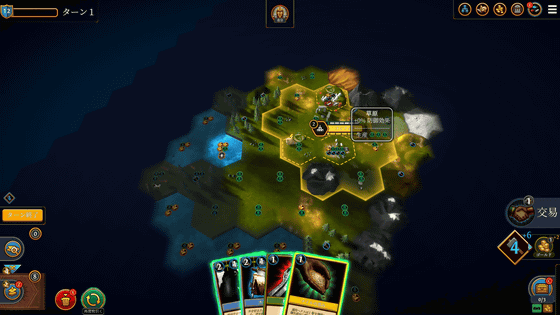
``Fortify'' and barricade yourself in
If your territory becomes too large, you'll come into contact with enemy countries in many places, so you'll literally have to keep fighting against the rest of the world. Creating military units does not increase victory points, so if you enter a world war, you tend to take the ridiculous policy of gaining points by occupying cities in enemy countries. In order to prevent this from happening, if you discover a passage-like hex around your country that says, ``If you close it off, you won't be invaded,'' you should give top priority to sending in military units and activating ``Fortification.'' Sho. Since you can stack multiple military units in the same hex, you can build up a strong base even without a 'fort'.
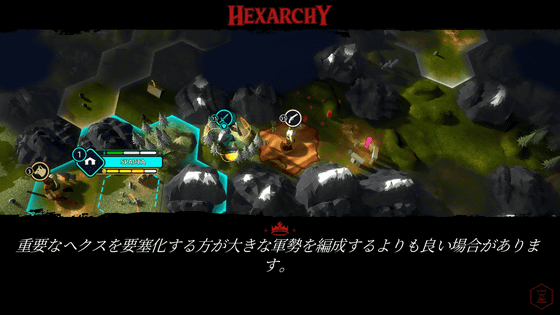
Move citizens to the 'capital'
If a phrase like ``If there are citizens in the capital...'' is written in the building as an activation condition, you will be able to obtain the effect by dragging the remaining citizens to the capital. Especially if the number of buildings in the capital increases and you can stack multiple effects, it may be overwhelmingly easy to move just one citizen, so you should attach at least one citizen to the capital. It's a good idea to keep building and strengthen your capital.
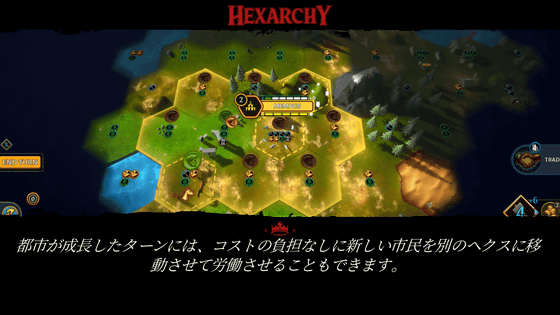
If you are unsure about securing resources, use “science”
If you burn and discard cards, you will receive 2 hammers and ``science'' at the beginning of each turn. As you can see from this fact, the more 'science' there is, the better. The reason is clear: to develop technology, we can use 'science' instead of using a hammer. In Hexarchy, if your technology is more advanced than your enemy's, you will have an advantage in all aspects, so if you look at the technology tree from the top right icon and decide to aim for this card, you can secure the technology in the shortest number of turns. We should also have a lot of ``science''. Even if you have a surplus, you can turn it into money through 'trade,' so you don't have to worry about having too much.
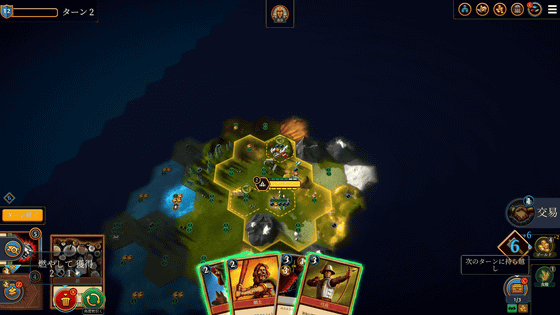
In this way, you can use 'science' instead of a hammer. Especially in the second half, the more 'science' you have, the faster you can accelerate. It's like advancing technology, burning the extra cards, and turning them into hammers and science...
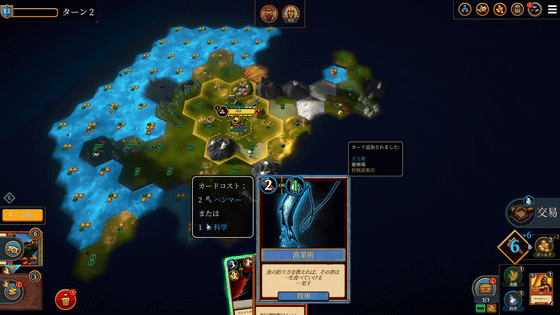
Hexarchy is sold on Steam and can be purchased for 2300 yen including tax.
Related Posts:







